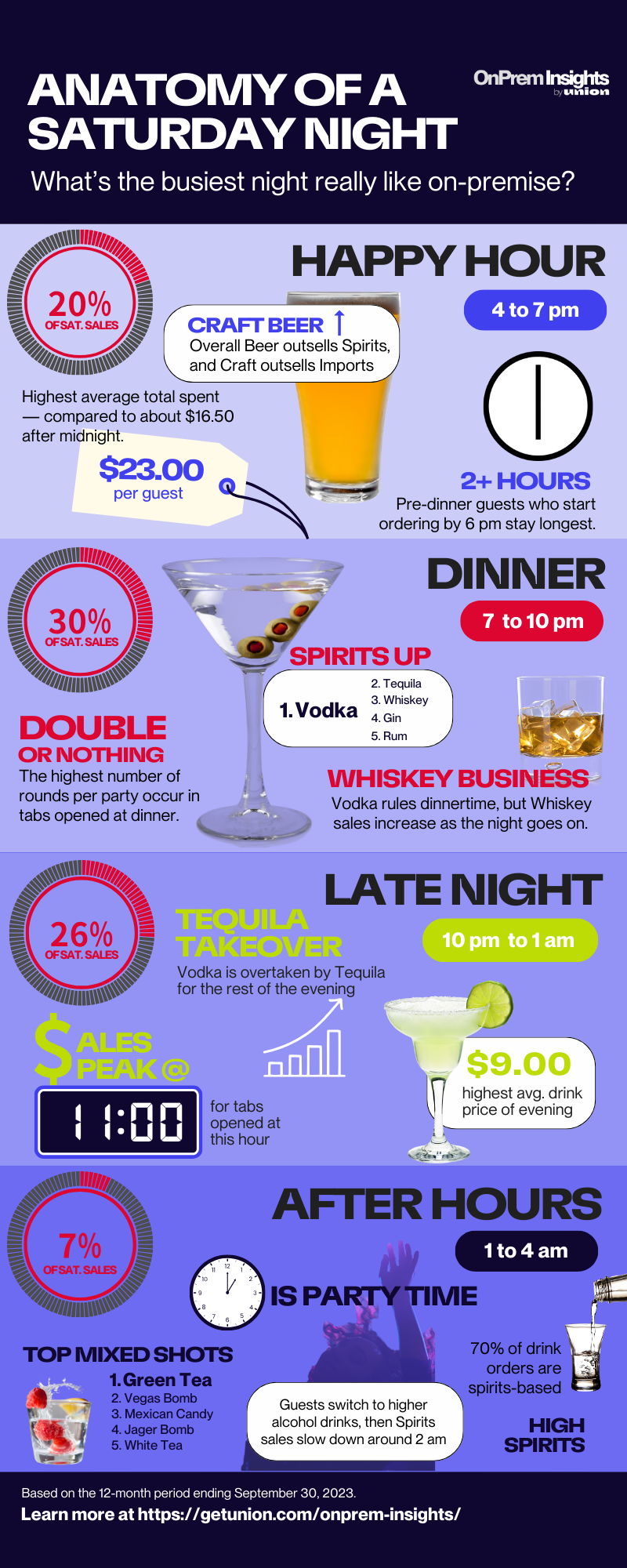Maximize Saturday Night (Infographic)
3 Min Read
Saturdays represent more than 25 percent of weekly sales., according to a new OnPrem Insights report by Union that provides insights on the make-it-or-break-it night of the week to help operators maximize drink sales from happy hour through the early hours of the morning.
Key takeaways include:
- Happy Hour (4 to 7 p.m.) – Based on Union’s data the happy hour daypart shows the highest average total spent per guest, and evening guests who start ordering by 6 p.m. stay the longest and leave with the highest tabs. It also indicates that beer sells best at about 4 p.m., comprising the highest sales share for beer of the entire evening.
- Dinner (7 to 10 p.m.) – Spirits sales start to pick up and rise steadily throughout the Saturday dinner daypart, while beer and wine sales see a decline. Union data shows that as guests order rounds of drinks, there’s a slight drink price decline for spirits, as guests trade down from premium brands.
- Late Night (10 p.m. to 1 a.m.) – Peak hour at Union venues, meaning the largest number of tabs are open at one time, is when the clock strikes 11 p.m. on a Saturday night. Furthermore, a guest’s average price per drink increases for tabs opened at 11 p.m., indicating that more expensive drinks are being ordered from guests who open tabs later in the evening.
- After Hours (1 to 4 a.m.) – Tabs opened in the 1 a.m. hour see the highest share of spirits and cocktail sales throughout the night and tequila is the spirit of choice. However, after 2 a.m., many guests wind down with beer. Union’s data also shows that tips tend to be the highest during this daypart.
“Saturday night is the biggest night of the week, and it’s one that operators need to think about strategically in order to maximize the opportunity,” said Layne Cox, CMO at Union. “The happy hour and late night dayparts are true growth areas for bars and restaurants in the year ahead. Our real-time data can arm venues with newfound insights that will lead to revenue growth as well as happier guests and staff, truly a win-win."
Modern Restaurant Management (MRM) magazine reached out to Cox for more suggestions on how restaurants and bars can maximize Saturday nights.
What are your suggestions for things restaurants/bars can do to capitalize on this information?
With the data in our Saturday night report, there are a few immediate things bars and restaurants can do to capitalize on the busiest night of the week. First, it’s essential for operators to educate staff around the benefits of selling premium-priced drinks during the first ordering round. This way, the pricier drinks are bought right away, and then the staff can continue to recommend other premium spirits as they continue to order.
Based on the data in our report, tabs opened at the 1 a.m. hour see the highest share of spirits and cocktail sales throughout the night, and tequila is the spirit of choice. That said, busy bars and restaurants should also take a look at their specials after midnight and incorporate more spirits into their offerings, specifically tequila.
By understanding the trends and timing based on the survey results, how can restaurants better deal with supply and staffing to meet customer demand?
Our report contains some great insight into how to maximize supply and staffing on Saturday nights. One of the biggest takeaways is that operators should prioritize staffing and make sure supply is well stocked for happy hour, as that’s where sales across the board are the strongest. Ensuring the bar is organized for quick access to your most popular items and any special happy hour cocktails are pre-batched will help set employees up for success.
One of the best tools to help staff better prepare for day-part fluctuations is leaning into tech solutions. For example, guest-led ordering platforms, such as Union, allow customers to order drinks through their mobile devices and pay at their leisure at any point in the night. This gives staff the ability to expand their coverage area by three times, and customer satisfaction increases as guests get their drinks faster and don’t have to wait to order or get a check through a server or bartender.
How important is real-time data to being more efficient and successful?
Real-time data has proven to be very helpful for operators, enabling them to enhance everything from the guest experience to inventory management. Data helps bars and restaurants be more strategic regarding staffing, adjusting menus and inventory based on actual demand. Operators can also help venues better understand guest behavior and promote trial and discovery. For example, Union’s data-centric platform enables highly personalized recommendations to be pushed out to returning or reordering guests by tapping into their stored preferences and order history. The more data there is, the more insights operators have to successfully please their guests and create a positive overall experience for everyone involved.


